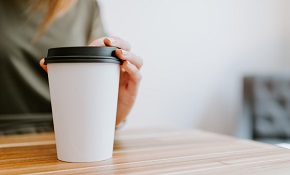24 6 月, 2022
A taxing debate with no surprises just yet | News analysis
To tax or not to tax? That’s the question that’s sparking debate on the future of on-the-go packaging. Yet any charge will not deal with the half a million cups that are littered by various means. Philip Chadwick reports.

Whether it’s plastic bottles or coffee cups, the current thinking in Westminster is that a tax (or levy as it’s more pragmatically put) on individual types of packaging will provide the UK with a double win: a reduction in packs that will be littered; and a way of funding the UK’s recycling infrastructure.
But taxing the consumer comes at a price; the alternative argument is that you’re financially penalising people for consuming something they enjoy. And if people vote with their wallets and decide not to buy takeaway cups of coffee (assuming they haven’t brought with them a reusable cup) then does that mean that high street coffee shops will suffer?
Packaging industry bodies are keen to steer the government away from taxing the consumer. But what are the alternatives and is this all too late as politicians feel that they must be seen to be doing something on ocean pollution and litter?
The year started as 2017 ended; with a tax on packaging mooted. Last year’s budget floated the possibility of a tax on single-use packaging, such as plastic bottles. In January, MPs on the Environmental Audit Committee recommended a 25p levy on the sale of disposable coffee cups.
No surprises
The report’s findings might not come as a major surprise to anyone who sat through the committee’s evidence last year. While the industry put up a spirited defence, MPs’ line of questioning was sceptical of the recycling record of paper cups and the efforts to improve the situation.
“The UK throws away 2.5 billion disposable coffee cups every year,” said the committee’s chair Mary Creagh MP. “Almost none are recycled and half a million a day are littered. Coffee cup producers and distributors have not taken action to rectify this and government has sat on its hands.”
However, a 25p levy – dubbed the ‘latte levy’ – was considered a step too far for many in the packaging industry, even though the proposal suggested that the money raised from a levy should be reinvested in infrastructure.
“Those who do favour a levy seem to perceive it as a punishment for the industry,” notes Martin Kersh, executive director at the Foodservice Packaging Association (FPA). “It won’t achieve anything and it punishes the economy while also putting jobs at risk.”
“The consumer will always pay one way or another,” adds Dick Searle, chief executive of the Packaging Federation. “Will a tax change behaviour? If the price of a cup of coffee goes up 25p, will that put people off?”
There’s scepticism that a levy on any form of packaging will deter consumer behaviour when it comes to litter. But there is agreement that something needs to be done to boost the UK’s recycling infrastructure. After all, disposable coffee cups – like plastic bottles – contain valuable material that can be reused. While kerbside recycling has helped boost collection rates, litter bins in towns and cities aren’t scooping up these materials in the same volumes.
PRN reform
To combat this, key industry bodies have come together to call for reform of the Packaging Recovery Note (PRN) system, currently used to enable obligated businesses to meet their producer responsibility requirements for all the packaging they place on the market.
Alupro, the British Plastics Federation, the FPA, INCPEN and the Packaging Federation met with major UK brands and retailers to agree six principles for reform. These principles include: a system that financially rewards recyclability as well as inclusion of recycled content; allow the introduction of a universal labelling system; the proceeds of a new PRN fund would be distributed by an independent body; and Packaging Export Recovery Notes should remove their inherent advantage over PRNs.
“Business has to take the matter seriously,” says Kersh. “There has to be a solution to provide the funding to improve the waste management infrastructure.”
Kersh believes that Defra could reform the PRN system far quicker than implementing a tax on individual items of packaging; secondary legislation – following a period of consultation – could make PRN reform a reality early next year, argues Kersh.
Richard Burnett, market development manager at papermaker James Cropper, says that the quality of fibre in paper cups is high and can be turned into good quality paper products. While James Cropper doesn’t offer a view on the cup levy, Burnett does note that more money is needed.
“There is a need to increase infrastructure,” he says. “The technology exists to recycle but the issue is the collection of cups. It is a challenge. In-store is the easiest place to start but the high street is tricky. This is also about public awareness and education.”
Last year, James Cropper linked up with Veolia and Selfridges in Oxford Street to take disposable cups and turn them in the retailer’s iconic yellow shopping bags. The cups are directed to James Cropper’s Cupcycling plant in Burneside, which was opened in 2013. The papermaker has also worked on cup recycling with McDonald’s.
Collaboration
Burnett believes that to boost volumes, the industry has to work together. “No one business has a complete solution to this issue and work needs to be done throughout the supply chain,” he says. “We have a good base and awareness has been raised. It’s about creating a market for the fibre.”
The good news for those demanding that paper cups are recycled is that the supply chain is serious about the subject – recycling paper cups can be done and market demand is there. However, the question remains: who pays for the much needed investment in the UK’s recycling infrastructure?

